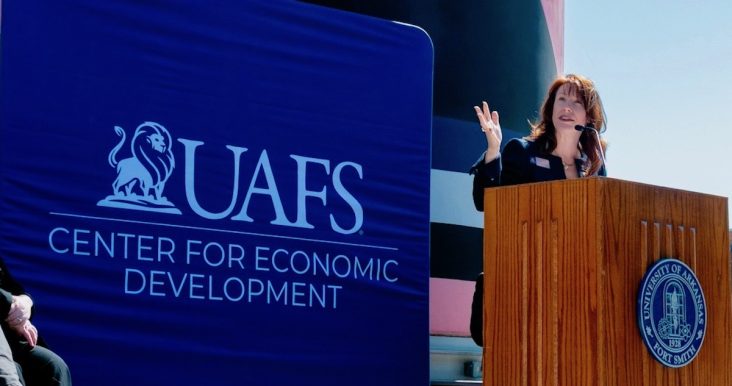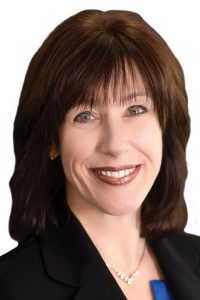UAFS Chancellor: Time so far has been ‘crazy wonderful’ and ‘chaotic’
by August 8, 2022 10:09 am 1,474 views

University of Arkansas at Fort Smith Chancellor Dr. Terisa Riley (photo courtesy of UAFS)
In the three years she’s been at the helm of the University of Arkansas at Fort Smith, Dr. Terisa Riley has experienced triumphs, defeats, challenges and of course, a global pandemic. She became the UAFS chancellor July 1, 2019, and is the institution’s first female leader.
Just a couple of months after she started, allegations of race discrimination were reported by a former player against the university’s head basketball coach. Though an investigation found no evidence of race discrimination, Riley addressed the issue by forming a diversity, equity and inclusion committee, to “review, unify, and strengthen UAFS’s diversity and inclusion efforts.”
The university hired John Blue as the first executive director of diversity, equity and inclusion at the university in January of 2020.
But things didn’t exactly ease for the new chancellor. In March 2020, the COVID-19 pandemic hit in full force and the university moved everything virtual, as did many universities around the globe.
In case a global pandemic was not enough to manage, Riley also had to tackle the proposal to continue a Sebastian County-wide one-fourth cent sales tax to support UAFS. When Westark College joined the University of Arkansas system and began the transition to a four-year institution, the college was no longer eligible to receive millage revenue. Sebastian County voters approved a one-fourth cent sales tax to go into effect Jan. 1, 2002, the same day the institution became UAFS, to help fund the transition and growth of the university. That sales tax was scheduled to sunset Jan. 1, 2022. Arkansas Act 1087 of 2013 gave UAFS the authority to request a sales-tax extension for 10 years.
In November 2020, the university took the proposal to extend the tax before the voters, who voted 56.45% against the tax renewal. Though the rejection of the tax was difficult, Riley said she understood the outcome.
“Understanding that $40 can mean the difference between feeding your children or not – and that the sunset of the sales tax is not an indictment of the university, but proof that we are a full four-year institution that can survive on its own and through diversifying revenue streams like a thriving university, ” Riley said.
REALIGNMENT, ENROLLMENT
The university has worked over the past year to counter the loss of that sales tax revenue. Riley announced in April 2021 that UAFS would realign its organizational structure beginning July 1, 2021. That realignment will result in $1.69 million in annual savings or new revenue, she said. Major changes included moving to a three college academic model including the College of Health, Education, and Human Sciences, the College of Business and Industry, and the College of Arts and Sciences. The university also created a Center for Student Success and Retention.
But among the challenges she has faced in the last three years, Riley has seen the university have big triumphs.

“It’s been crazy wonderful,” Riley said in a recent interview with Talk Business and Politics about the three years as chancellor. “I’m crazy in love with my place. But it has been pretty chaotic. I’ll be perfectly honest. But I think it has been chaotic for everyone. We’re all trying to figure out what it means to work, what it means to leave a legacy, to make a difference.”
UAFS has been in business for almost 100 years, Riley said, noting that it’s those who came before her who set the institute of higher learning up for success. The university has great places to learn and work. It has great colleagues. It has great students, she said.
“And we have worked hard since my arrival to help strengthen that team and to really think about the holistic development of our employees as well as our students,” Riley said.
Typically during a downturn in the country’s economy, people flock back to institutes of higher learning, Riley noted. They attempt to find ways to advance in their career or find a new career. That has not been the case in today’s world, she added. But many colleges and universities are struggling with enrollment. Arkansas saw a 14.2% drop in undergraduate enrollment from 2019 to 2022, going from about 138,800 students to 119,000 students, according to the National Student Clearinghouse.
“When I arrived, we knew every public regional institution in the county was facing a downturn in enrollment,” Riley said.
At UAFS, enrollment is flat. It hasn’t gone up, but it also hasn’t dropped significantly from enrollment last fall, Riley said. Though they of course would like to see enrollment rise, staying flat when many are losing students is good, she added.
“We have team members who are working strategically at (keeping enrollment up) every single day,” Riley said. “Whether it’s in strategic personal communications, building relationships, being out and active in our community, just making sure every school district knows what we offer. And also implementing things like our adult degree completion program, which started in fall 2019.”
In April, UAFS opened its Center for Economic Development at the Baker District in downtown Fort Smith, which was developed by Fort Smith businessman Bill Hanna. The center serves as a destination for workforce and personal training, planning, and advising, according to a UAFS statement. The center will house the university’s Center for Business and Professional Development and the Family Enterprise Center, both of which were housed in the Flanders Building on the UAFS campus. Also at the center is the Arkansas Small Business and Technology Development Center (ASBTDC)’s Fort Smith office, which works with business owners in Sebastian, Crawford and Scott counties.
“That is a good example of our investment in our community,” Riley said.
NEW PROGRAMS
Other things the university has accomplished in the past few years include maturing the university, investing in university programs with scholarships that allows more students to attend school, and adding more certificate programs for high school students through the newly opened Peak Innovation Center of Fort Smith Public Schools.
UAFS’ Western Arkansas Technical Center (WATC) serves high school students from Crawford, Franklin, Johnson, Logan, Scott, and Sebastian counties. Services are offered at no cost to the students. WATC provides books, tuition, and fees thanks to funding made available by the Department of Workforce Education and a training fee paid by the local school districts.
To supplement classroom exposure, students gain practical experience during later-term apprenticeships which are modeled to provide real-world learning. Apprenticeships are completed throughout the student’s senior year, allowing them to capitalize on the technical concurrent college credit courses offered through Peak and WATC.
“We’ve only been offering four-year degrees here for about 20 years, which is pretty shocking when you realize we offer about 45 four-year major programs and we also began our master degree in education program since my arrival,” Riley said, giving all the credit to the education department. “And through Peak we are filling a need in the community. Students can graduate from high school with those skills, which is really a game changer for local employers.”
Another highlight, Riley mentioned, was that even though the university has raised its tuition some, it is still the most affordable university in the state.
“We have a strong Composite Financial Index, robust foundation, and very low tuition and fee rate – so even though we increased some tuition and fees, we are still the lowest 4-year campus in the state,” Riley said. “Less than one-third of our students take out loans.”
The university is also embarking on a strategic plan it hopes to launch in January. The foundational structure of strategic planning will include key performance indicators and success metrics that will be announced publicly for accountability and transparency, Riley said. The university will be tying resource planning to the pillars of the strategic plan, ensuring allocation of funds, new revenue streams, and grant applications will align with the strategic plan, she said.
Riley has also embraced her new home, becoming involved in many boards throughout the Fort Smith metro area, including the Fort Chaffee Redevelopment Association board of directors and the United Way of Fort Smith board of directors.
“I have always known in my career that service comes with it. Being involved in the community is very important to me,” Riley said. “But it also is a little selfish. It’s a very good way to connect with those we need to connect with as a university.”
